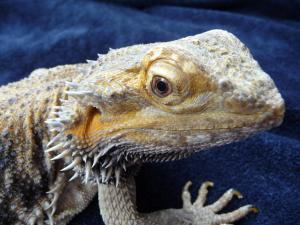Vitamin A Deficiency in Insect-Eating Lizards
- posted: Sep. 15, 2018
 Vitamin A Deficiency in Lizards
Vitamin A Deficiency in Lizards
Several species of captive lizards that eat a diet consisting of only insects may be prone to a deficiency of vitamin A which can lead to health problems. Affected species commonly kept as pets include leopard geckos, chameleons and anoles. Wild lizards and those who eat both plants and insects are less likely to have this deficiency due to a more varied diet.
Insectivorous lizards may be unable to produce their own vitamin A, and diets may be lacking if the pet lizard is not receiving a multivitamin containing vitamin A or is eating feeder insects such as crickets that are not fed a diet rich in vitamin A. There is often misconception that vitamin A is toxic to some reptiles. While it is true that very high levels of vitamin A may be toxic to the liver, lack of proper amounts of vitamin A in the diet is much more of a concern than too much.
Why do certain reptiles need vitamin A? Vitamin A is essential to proper growth of immature epidermal or skin cells. Lack of vitamin A causes excessive growth or thickening of cells (hyperkeratosis) and may also cause cells to change shape from a cuboidal or columnar shape into a flat (squamous) cell. The cells or organs most commonly affected include the eyes, respiratory, gastro-intestinal systems.
Symptoms include dull skin color, decreased appetite or difficulty catching insects, excess tear production and squinting of the eyes. Affected lizards also have trouble shedding their skin and may develop buildup of thick cellular material under the eyelids covering the eyes. They may experience temporary or permanent blindness. Affected patients are diagnosed based on dietary history and clinical signs as blood tests are often inaccurate. Other causes for disease must be ruled out.
Treatment consists of supportive care such as feeding calorie supplements and administering fluids, removing any debris from around the eyes and applying antibiotic ointments to the eyes, and, of course, adding vitamin A supplements to the diet. Feeding a diet consisting of as many different insects as possible, “gut-loading” insects used for food with diets high in vitamin A and calcium, dusting insects with calcium and using multi-vitamin supplements containing vitamin A twice a month. Prognosis is poor for those lizards who have advanced clinical signs or who have been affected for more than six months, but, if caught early and the diet corrected, most will recover.
If you have a captive insect-eating lizard, talk to your vet about proper diet and nutrition to help prevent vitamin A deficiency.
This blog brought to you by the Patton Veterinary Hospital serving Red Lion, York and the surrounding communities.
https://www.cliniciansbrief.com/article/vitamin-deficiency-insectivorous-lizards
Location
Patton Veterinary Hospital
425 E Broadway
Red Lion, PA 17356
